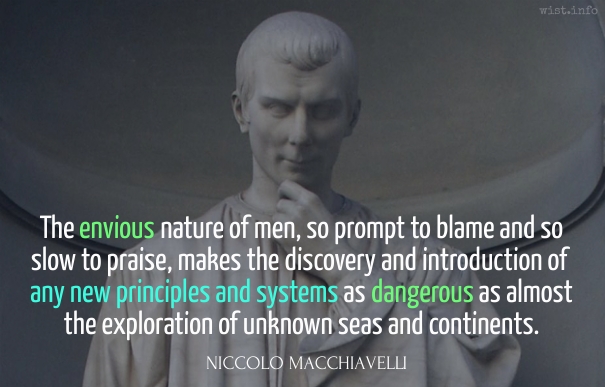SUCCESS, n. The one unpardonable sin against one’s fellows.
Ambrose Bierce (1842-1914?) American writer and journalist
“Success,” The Devil’s Dictionary (1911)
(Source)
Originally published in The Devil's Dictionary [A-Z] as Vol. 7 of his Collected Works.
Quotations about:
jealousy
Note not all quotations have been tagged, so Search may find additional quotes on this topic.
Jealousy is all the fun you think they had ….
Many speak the truth, when they say that they despise riches and preferment, but they mean the riches and preferment possessed by other men.
Charles Caleb "C. C." Colton (1780-1832) English cleric, writer, aphorist
Lacon: Or, Many Things in Few Words, Vol. 1, § 371 (1820)
(Source)
The man who has double my salary is doubtless tortured by the thought that someone else in turn has twice as much as he has, and so it goes on. If you desire glory, you may envy Napoleon. But Napoleon envied Caesar, Caesar envied Alexander, and Alexander, I daresay, envied Hercules, who never existed. You cannot, therefore, get away from envy by means of success alone, for there will always be in history or legend some person even more successful than you are. You can get away from envy by enjoying the pleasures that come your way, by doing the work that you have to do, and by avoiding comparisons with those whom you imagine, perhaps quite falsely, to be more fortunate than yourself
Bertrand Russell (1872-1970) English mathematician and philosopher
Conquest of Happiness, Part 1, ch. 6 “Envy” (1930)
(Source)
Merely to realize the causes of one’s own envious feelings is to take a long step towards curing them. The habit of thinking in terms of comparison is a fatal one.
He who ascends to mountain-tops, shall find
The loftiest peaks most wrapt in clouds and snow;
He who surpasses or subdues mankind
Must look down on the hate of those below.George Gordon, Lord Byron (1788-1824) English poet
Childe Harold’s Pilgrimage, Canto 3, st. 45 (1816)
(Source)
In manuscript form, the last line is "Must look down on the hate of all below."
Grief often inspires other odd emotions, and pettiness — the jealous assertion of one’s own claims as a mourner — is one of the commonest.
IAGO: O, beware, my lord, of jealousy!
It is the green-eyed monster which doth mock
The meat it feeds on.William Shakespeare (1564-1616) English dramatist and poet
Othello, Act 3, sc. 3, ll. 195ff (3.3.195-197) (1603)
(Source)
Probable origin not just of the term "green-eyed monster" for jealousy / envy, but (along with his previous use of "green-eyed jealousy" in The Merchant of Venice, 3.2.113) of the association of the color green with the emotion.
IMMORALITY. The morality of those who are having a better time.
H. L. Mencken (1880-1956) American writer and journalist [Henry Lewis Mencken]
The Book of Burlesques, “The Jazz Webster” (1920)
(Source)
Variant:Immorality is the morality of those who are having a better time.
[Chrestomathy, ch. 30 "Sententiae" (1949)]
CONGRATULATION, n. The civility of envy.
Ambrose Bierce (1842-1914?) American writer and journalist
“Congratulation,” The Cynic’s Word Book (1906)
(Source)
Included in The Devil's Dictionary (1911). Originally published in the "Devil's Dictionary" column in the San Francisco Wasp (1881-08-12).
Envy iz sutch a constant companyun, that if we find no one abuv us to envy, we will envy thoze below us.
[Envy is such a constant companion, that if we find no one above us to envy, we will envy those below us.]
Josh Billings (1818-1885) American humorist, aphorist [pseud. of Henry Wheeler Shaw]
Everybody’s Friend, Or; Josh Billing’s Encyclopedia and Proverbial Philosophy of Wit and Humor, “Plum Pits” (1874)
(Source)
There is no joy on this earth like falling in love with a woman and managing at the same time the trick of keeping just enough perspective to see her fall in love too, to see her begin to see you in a different way, to see her color change, eyes soften, her hand of itself reach for you. … And there is no pain on this earth like seeing the same woman look at another man the way she once looked at you.
The envious nature of men, so prompt to blame and so slow to praise, makes the discovery and introduction of any new principles and systems as dangerous as almost the exploration of unknown seas and continents.
Moral indignation is in most cases 2 percent moral, 48 percent indignation, and 50 percent envy.
Vittorio De Sica (1901-1974) Italian neorealist director and actor
In The Observer (1961)
See also H. G. Wells.
ORLANDO: But, O, how bitter a thing it is to look into happiness through another man’s eyes!
William Shakespeare (1564-1616) English dramatist and poet
As You Like It, Act 5, sc. 2, l. 45ff (5.2.45) (1599)
(Source)
Nothing is to be done out of jealousy or vanity; instead, out of humility of mind everyone should give preference to others, everyone pursuing not selfish interests but those of others.
[μηδὲν κατ᾽ ἐριθείαν μηδὲ κατὰ κενοδοξίαν ἀλλὰ τῇ ταπεινοφροσύνῃ ἀλλήλους ἡγούμενοι ὑπερέχοντας ἑαυτῶν, μὴ τὰ ἑαυτῶν ἕκαστος σκοποῦντες ἀλλὰ [καὶ] τὰ ἑτέρων ἕκαστοι.]
The Bible (The New Testament) (AD 1st - 2nd C) Christian sacred scripture
Philippians 2: 3-4 [NJB (1985)]
(Source)
(Source (Greek)). Alternate translations:Let nothing be done through strife or vainglory; but in lowliness of mind let each esteem other better than themselves. Look not every man on his own things, but every man also on the things of others.
[KJV (1611)]There must be no competition among you, no conceit; but everybody is to be self-effacing. Always consider the other person to be better than yourself, so that nobody thinks of his own interests first but everybody thinks of other s people's interests instead.
[JB (1966)]Don't do anything from selfish ambition or from a cheap desire to boast, but be humble toward one another, always considering others better than yourselves. And look out for one another's interests, not just for your own.
[GNT (1992 ed.)]Don’t do anything for selfish purposes, but with humility think of others as better than yourselves. Instead of each person watching out for their own good, watch out for what is better for others.
[CEB (2011)]Do nothing from selfishness or empty conceit, but with humility consider one another as more important than yourselves; do not merely look out for your own personal interests, but also for the interests of others.
[NASB (2020 ed)]Do nothing from selfish ambition or empty conceit, but in humility regard others as better than yourselves. Let each of you look not to your own interests but to the interests of others.
[NRSV (2021 ed.)]
The first thing that happens to men once they have had to give up any pleasure, whether for propriety’s sake, or from satiety, or for their health, is to condemn it in other people. Such behavior implies a sort of attachment to the very things one has just renounced: we want nobody else to enjoy the good things that we have lost; it is a feeling of jealousy.
[La première chose qui arrive aux hommes après avoir renoncé aux plaisirs, ou par bienséance, ou par lassitude, ou par régime, c’est de les condamner dans les autres. Il entre dans cette conduite une sorte d’attachement pour les choses mêmes que l’on vient de quitter; l’on aimerait qu’un bien qui n’est plus pour nous ne fût plus aussi pour le reste du monde: c’est un sentiment de jalousie.]
Jean de La Bruyère (1645-1696) French essayist, moralist
The Characters [Les Caractères], ch. 11 “Of Mankind [De l’Homme],” § 112 (11.112) (1688) [tr. Stewart (1970)]
(Source)
(Source (French)). Alternate translations:The first thing men do, when they have renounc'd pleasure, either out of decency, surfeit, or conviction, is to condemn it in others. This sort of management is however seldom free from a particular affection for those very things they left off, but they would have no body enjoy the pleasure they can no longer enjoy themselves, which proceeds more from Jealousie than any thing else.
[Bullord ed. (1696)]The first thing Men do, when they have renounc'd Pleasure, either out of Decency, Surfeit, or Conviction, is to condemn it in others. They preserve, in this Conduct, a sort of Affection for the very things they left off; they would have no body enjoy the Pleasure they can no longer enjoy themselves: 'Tis a sentiment of Jealousy.
[Curll ed. (1713)]The first Thing, when Men have renounced Pleasure, either out of Decency, Satiety, or Necessity, is to condemn it in others. This Sort of Reproof, however, is not free from a latent Affection for their forsaken Pleasures; they would interdict to all others what they can themselves no longer enjoy; their Admonitions are the Snarlings of Jealousy, not the Dictates of Purity.
[Browne ed. (1752)]The first thing men do when they have renounced pleasure, through decency, lassitude, or for the sake of health, is to condemn it in others. Such conduct denotes a kind of latent affection for the very things they left off; they would like no one to enjoy a pleasure they can no longer indulge in; and thus they show their feelings of jealousy.
[tr. Van Laun (1885)]
Licinius, trust a seaman’s lore:
Steer not too boldly to the deep,
Nor, fearing storms, by treacherous shore
Too closely creep.
Who makes the golden mean his guide,
Shuns miser’s cabin, foul and dark,
Shuns gilded roofs, where pomp and pride
Are envy’s mark.
[Rectius vives, Licini, neque altum
semper urgendo neque, dum procellas
cautus horrescis, nimium premendo
litus iniquum.
Auream quisquis mediocritatem
diligit, tutus caret obsoleti
sordibus tecti, caret invidenda
sobrius aula.]Horace (65-8 BC) Roman poet, satirist, soldier, politician [Quintus Horatius Flaccus]
Odes [Carmina], Book 2, # 10, l. 1ff (2.10.1-8) (23 BC) [tr. Conington (1872)]
(Source)
To Licinius Varro Murena, who was later executed as a conspirator against Augustus.
(Source (Latin)). Alternate translations:The safest way of life, is neither
To tempt the Deeps, nor whilst foul weather
You fearfully avoid, too near
The shore to steer.
He that affects the Golden Mean,
Will neither want a house that's clean,
Nor swell unto the place of showres
His envy'd Towres.
[tr. Fanshaw; ed. Brome (1666)]Wise they, that with a cautious fear
Not always thro the Ocean Steer,
Nor, whilst they think the Winds will roar,
Do thrust too near the rocky Shore:
To those that choose the golden Mean:
The Waves are smooth, the Skies serene;
They want the baseness of the Poors retreat,
And envy'd Houses of the Great.
[tr. Creech (1684)]Receive, dear friend, the truths I teach,
So shalt thou live beyond the reach
Of adverse fortunes pow'r;
Not always tempt the distant deep,
Nor always timorously creep
Along the treach'rous shore.
He that holds fast the golden mean,
And lives contentedly between
The little and the great,
Feels not the wants that pinch the poor,
Nor plagues that haunt the rich man's door,
Imbitt'ring all his state.
[tr. Cowper (1782?)]O Licinius, you will lead a more correct course of life, by neither always pursuing the main ocean, nor, while you cautiously are in dread of storms, by pressing too much upon the hazardous shore. Whosoever loves the golden mean, is secure from the sordidness of an antiquated cell, and is too prudent to have a palace that might expose him to envy.
[tr. Smart/Buckley (1853)]If thou wouldst live secure and free,
Thou wilt not keep far out at sea,
Licinius, evermore;
Nor, fearful of the gales that sweep
The ocean wide, too closely creep
Along the treacherous shore.
The man, who with a soul serene
Doth cultivate the golden mean,
Escapes alike from all
The squalor of a sordid cot,
And from the jealousies begot
By wealth in lordly hall.
[tr. Martin (1864)]Licinius, wouldst thou steer life's wiser voyage,
Neither launch always into deep mid-waters,
Nor hug the shores, and, shrinking from the tempest,
Hazard the quicksand.
He who elects the golden mean of fortune,
Nor where dull squalor rots the time-worn hovel,
Nor where fierce envy storms the new-built palace,
Makes his safe dwelling.
[tr. Bulwer-Lytton (1870)]Neither always tempt the deep,
Nor, Licinius, always keep,
Fearing storms, the slippery beach:
Such the rule of life I teach.
Golden is the middle state;
Love the middle gifts of fate,
Not the sloven squalid cot,
Proud and envied palace not.
[tr. Gladstone (1894)]Better, Licinius, wilt thou live, by neither
Tempting the deep for ever, nor, while tempests
Cautiously shunning, by too closely hugging
Shores that are treach'rous.
He who the golden mean adopts, is ever
Free from the sorrows of a squalid dwelling; --
Free from the cares attending on the envied
Halls of the wealthy.
[tr. Phelps (1897)]Licinius, better wilt thou live by neither urging
Alway out to sea, nor, while on guard 'gainst storms
Thou shudderest, by pressing an evil shore
Too close.
Whoever courts a golden mean is safe
To escape the squalor of a mouldered roof.
And shrewd to escape a paJace that may
Be grudged to him.
[tr. Garnsey (1907)]Safer thou'lt sail life's voyage, if them steer
Neither right out to sea, nor yet, when rise
The threat'ning tempests, hug the shore too near,
Unwisely wise.
What man soe'er the golden mean doth choose,
Prudent will shun the hovel's foul decay;
But with like sense, a palace will refuse
And vain display.
[tr. Marshall (1908)]Better wilt thou live, Licinius, by neither always pressing out to sea nor too closely hugging the dangerous shore in cautious fear of storms. Whoso cherishes the golden mean, safely avoids the foulness of an ill-kept house and discreetly, too, avoids a hall exciting envy.
[tr. Bennett (Loeb) (1912)]Licinius, would you live aright,
Tempt not the high seas evermore,
Nor, fearing tempests, in your fright
Too closely hug the dangerous shore.
Who loves the golden mean is free
And safe from grime -- the grime a house
Harbours in eld; his modesty
Earns not the envy mansions rouse.
[tr. Mills (1924)]Sail not too far to be safe, O Licinius!
Neither too close to the shore should you steer.
Rashness is foolish, and how ignominious
Cowardly fear!
He who possesses neither palace nor hovel
(My little flat would be half way between)
Hasn't a house at which paupers must grovel
Yet it is clean.
[tr. Adams (1928)]Licinius, to live wisely shun
The deep sea; on the other hand,
Straining to dodge the storm don't run
Too close in to the jagged land.
All who love safety make their prize
The golden mean and hate extremes:
Mansions are envied for their size,
Slums pitied for their rotting beams.
[tr. Michie (1963)]Licinius, life makes better sense
Lived neither pushing farther and farther
To sea, nor always hugging the dangerous
Shore, shaking at the thought of storms.
Cherish a golden mean and stay
Exempt from a filthy hovel
And exempt from the envy
A mansion excites.
[tr. Raffel (1983)]You'll do better, Licinius, not to spend your life
Venturing too far out on the dangerous waters,
Or else, for fear of storms, staying too close in
To the dangerous rocky shoreline, That man does best
Who chooses the middle way, so he doesn't end up
Living under a roof that's going to ruin
Or in some gorgeous mansion everyone envies.
[tr. Ferry (1997)]Better will you live, O Licinius, not always urging yourself out upon the high seas, nor ever hugging the insidious shore in fear of storms. He who esteems the golden mean safely avoids the squalor of a wretched house and in sobriety, equally shuns the enviable palace.
[tr. Alexander (1999)]You’ll live more virtuously, my Murena,
by not setting out to sea, while you’re in dread
of the storm, or hugging fatal shores
too closely, either.
Whoever takes delight in the golden mean,
safely avoids the squalor of a shabby house,
and, soberly, avoids the regal palace
that incites envy.
[tr. Kline (2015)]
There is nobody so irritating as somebody with less intelligence and more sense than we have.
Don Herold (1889-1966) American humorist, cartoonist, author
So Human, “Shetland Ponies vs. Autos,” epigraph (1924)
(Source)
Man will do many things to get himself loved, he will do all things to get himself envied.
Mark Twain (1835-1910) American writer [pseud. of Samuel Clemens]
Following the Equator, ch. 21, epigraph (1897)
(Source)
Anger and jealousy can no more bear to lose sight of their objects than love.
George Eliot (1819-1880) English novelist [pseud. of Mary Ann Evans]
The Mill on the Floss (1860)
(Source)
The conviction of the rich that the poor are happier is no more foolish than the conviction of the poor that the rich are.
Mark Twain (1835-1910) American writer [pseud. of Samuel Clemens]
(Misattributed)
I cannot find any reference to this phrase prior to 1921, and no association with Twain until the mid-1970s.
The quotation apparently first appears in various newspaper "filler" columns (e.g., 1921-12-07); in no cases is there an attribution to Twain or to anyone else, except some references of it having been originally seen in the Boston Post (e.g., 1921-12-17, 1921-12-16, 1921-12-07).
One place where a name is associated with the quote is where it appears in the "Facts and Fancies" syndicated column of quips by Robert Quillen (1921-12-07). Quillen (1887-1948) was an American journalist and humorist, whose work was syndicated in hundreds of newspapers. He was know for, among other things, his one-liners. It's unclear whether he adopted material from others, or originated everything in "Facts and Fancies." If the latter, and if the column also appeared in the Boston Post, that would indicate Quillen actually is the source of this quotation.
One place for some doubt is that the one Quillen column shows a date of December 7, but so do some other papers which ran the quote. It is possible, as the actual publication dates of syndicated material can vary between papers or be delayed, that Quillen's column in the paper above ran after its original appearance (in the Boston Globe?), which other papers then stole from as filler material without crediting Quillen.
Twain, who died in 1910, does not seem associated with the quote until the mid-1970s, and it does not show up in more authoritative collections of Twain material. The association to Twain seems to come from Laurence J Peter, Peter's Quotations (1977). Peter included the phrase as a parenthetical comment to a Mark Twain quotation. The proximity may have led to Twain being associated with it (as here, which duplicates the entry from Peter, but with the attribution following the combined two quotes).
In sum, the quotation first appeared in December 1921, a decade after Twain's death, and was possibly created by Robert Quillen. It's association to Mark Twain came from its use by Lawrence Peter as an editorial comment to a different Twain quotation.























